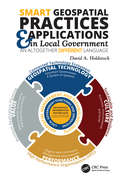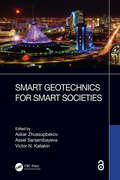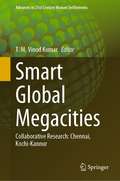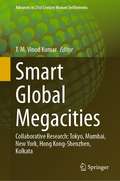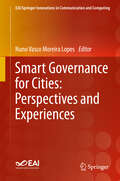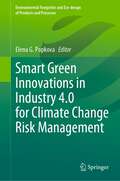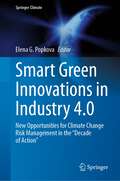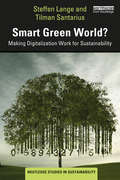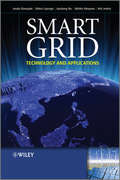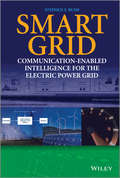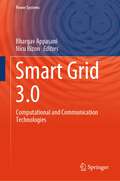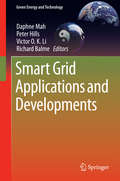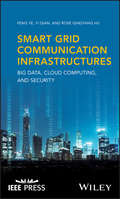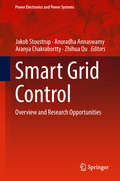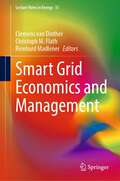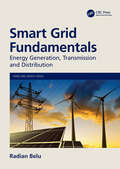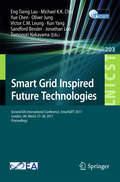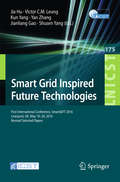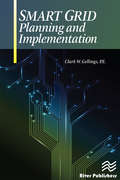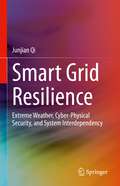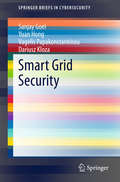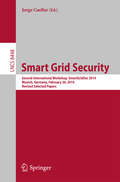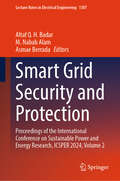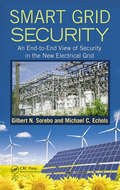- Table View
- List View
Smart Geospatial Practices and Applications in Local Government: An Altogether Different Language
by David A. HoldstockThe demand on local government to do more with less by improving operations, increasing productivity, and making better and more informed decisions increases constantly. On a departmental level Geographic Information Systems are helping meet this demand but the majority of local government organizations do not take the time to understand the GIS needs and opportunities of each and every department. This book: Discusses how towns, cities and counties and their specific departments should actually use GIS Explains the best ways to use GIS tools through many specific case studies and step by step instructions Emphasises local government needs first before offering solutions Gives readers a practical and understandable way of thinking about managing and making GIS successful This book is the guide that details best GIS applications and practices for the 34 departments in local government that can, and should, use GIS technology. It explains in details how, why, and what each department should implement, a clear and understandable explanation of departmental GIS.
Smart Geotechnics for Smart Societies: Proceedings of the 17th Asian Regional Conference on Soil Mechanics and Geotechnical Engineering (17th ARC, Astana, Kazakhstan, 14-18 August, 2023)
by Askar ZhussupbekovSmart Geotechnics for Smart Societies contains the contributions presented at the 17th Asian Regional Conference on Soil Mechanics and Geotechnical Engineering (17th ARC, Astana, Kazakhstan, 14-18 August, 2023). The topics covered include: - Geomaterials for soil improvement - Tunneling and rock engineering - Slope, embankments and dams - Shallow and deep foundations - Soil dynamics and geotechnical earthquake engineering - Geoenvironmental engineering and frost geotechnics - Investigation of foundations of historical structures and monitoring - Offshore, harbor geotechnics and GeoEnergy - Megaprojects and transportation geotechnics Smart Geotechnics for Smart Societies will be of interest to academics and engineers interested or involved in geotechnical engineering.
Smart Global Megacities: Collaborative Research: Chennai, Kochi-Kannur (Advances in 21st Century Human Settlements)
by T. M. Vinod KumarThis book, the second volume, highlights 7 out of a total of about 36 megacities in the World which by definition have 10 million inhabitants. The cities/chapters presented in this book are based on recent advance such as the wide use of ICT, IOT, e-Governance, e-Democracy, smart economy and flattening and acceleration of the world that is taking place in recent times as reported by 3 times Pulitzer Prize Winner Thomas Friedman. It therefor departs from other ideologies where only a certain megacity qualifies for the title of smart global megacities while in reality every megacity can, and presents how smart global megacities can be created.
Smart Global Megacities: Collaborative Research: Tokyo, Mumbai, New York, Hong Kong-Shenzhen, Kolkata (Advances in 21st Century Human Settlements)
by T. M. Vinod KumarThis book, the first volume, highlights 8 out of a total of about 36 megacities in the World which by definition have 10 million inhabitants. The cities/chapters presented in this book are based on recent advance such as the wide use of ICT, IOT, e-Governance, e-Democracy, smart economy and flattening and acceleration of the world that is taking place in recent times as reported by 3 times Pulitzer Prize Winner Thomas Friedman. It therefor departs from other ideologies where only a certain megacity qualifies for the title of smart global megacities while in reality every megacity can, and presents how smart global megacities can be created.
Smart Governance for Cities: Perspectives and Experiences (EAI/Springer Innovations in Communication and Computing)
by Nuno Vasco Moreira LopesThis book provides theoretical perspectives and practical experiences on smart governance for smart cities. It presents a balanced linkage between research, policies and practices on this area. The authors discuss the sustainability challenges raised by rapid urbanization, challenges with smart governance models in various countries, and a new governance paradigm seen as a capable approach able to overcome social, economic and environmental sustainability problems. The authors include case studies on transformation, adaption and transfers; and country, regional, municipal contextualization. Also included are best practices on monitoring and evaluating smart governance and impact assessment. The book features contributions from researchers, academics, and practitioners in the field. Analyzes smart governance for cities from a variety of perspectives and a variety of sectors – both in theory and in practiceFeatures information on the linkage between United Nations Sustainable Development Goals and smart governanceCovers the connection between research, policies and practice in smart governance for smart cities
Smart Green Innovations in Industry 4.0 for Climate Change Risk Management (Environmental Footprints and Eco-design of Products and Processes)
by Elena G. PopkovaThis book is devoted to strengthening the theoretical and methodological basis, systematization of international experience, and scientific elaboration of prospects for developing a climate-smart economy and business as a vector of the sustainable development of Industry 4.0 in the Decade of Action. The first part of the book focuses on climate-responsible entrepreneurship in support of the sustainable development of Industry 4.0. The part systematizes best practices for climate-smart green innovations across sectors of the digital economy. The third part reveals the experience of climate risk management based on smart green innovations in regions and countries. Particular attention is paid to the best practices of the European Union (EU) and the Eurasian Economic Union (EAEU). The book ends with part four, which explores ESG climate risk management and green finance in support of combating climate change. The book’s novelty is that it rethinks the environmental footprints of Industry 4.0 from the perspective of climate risks and their management. The theoretical significance of the book lies in the formation of an innovative concept of climate change risk management, in which the economy, society, nature, and technology are presented and interact effectively. The book is intended for scientists. In this book, they will find an innovative and systemic vision of smart green innovations in Industry 4.0 for climate change risk management.
Smart Green Innovations in Industry 4.0: New Opportunities for Climate Change Risk Management in the “Decade of Action” (Springer Climate)
by Elena G. PopkovaThis book is concerned with the study of climate change from the perspective of risks for the economy and business. Rethinking climate change from a risk perspective allows making a significant transition from the consideration of climate as a predetermined and permanent context to its interpretation as a factor that influences the economy and business. Thanks to the new risk perspective on climate change, the book offers opportunities and offers recommendations for adapting businesses and economic sectors to climate risks.As a forward-looking response (management measure) to the risks of climate change in the economy and business, this book suggests using smart green innovations in Industry 4.0 – high technologies in support of the sustainable development goals (SDGs). The advantage of smart technologies to combat climate change is their increased flexibility and adaptability, as well as the resistance of smart (automated, robotic) machines to different environmental conditions.The academic significance of the book is attributable to the fact that it covers, as widely and comprehensively as possible, the full range of ground-breaking smart green innovations in Industry 4.0 with a potential of climate change risk management: from green finance (for example, blockchain-based cryptocurrencies) to smart and clean energy, as well as smart industrial innovations in Industry 4.0. The combination of public and corporate risk management measures of climate change allows achieving a “synergetic effect” in the form of enhanced support for the implementation of the SDGs.
Smart Green World?: Making Digitalization Work for Sustainability (Routledge Studies in Sustainability)
by Tilman Santarius Steffen LangeIn this book, Steffen Lange and Tilman Santarius investigate how digitalization influences environmental and social sustainability. The information revolution is currently changing the daily lives of billions of people worldwide. At the same time, the current economic model and consumerist lifestyle needs to be radically transformed if society is to overcome the challenges humanity is facing on a finite planet. Can the much-discussed disruption potential of digitalization be harnessed for this purpose? Smart Green World? provides guiding principles for a sustainable digital society and develops numerous hands-on proposals for how digitalization can be shaped to become a driving force for social transformation. For instance, the authors explain why more digitalization is needed to realize the transition towards 100% renewable energy and show how this can be achieved without sacrificing privacy. They analyze how the information revolution can transform consumption patterns, mobility habits and industry structures – instead of fostering the consumption of unneeded stuff due to personalized commercials and the acceleration of life. The authors reveal how Artificial Intelligence and the Industrial Internet of Things pose novel environmental challenges and contribute to a polarization of income; but they also demonstrate how the internet can be restored to its status as a commons, with users taking priority and society at large reaping the benefits of technological change in a most democratic way. Providing a comprehensive and practical assessment of both social and environmental opportunities and challenges of digitalization, Smart Green World? Making Digitalization Work for Sustainability will be of great interest to all those studying the complex interrelationship of the twenty-first-century megatrends of digitalization and decarbonization.
Smart Grid
by Janaka Ekanayake Nick Jenkins Jianzhong Wu Kithsiri Liyanage Akihiko YokoyamaElectric power systems worldwide face radical transformation with the need to decarbonise electricity supply, replace ageing assets and harness new information and communication technologies (ICT). The Smart Grid uses advanced ICT to control next generation power systems reliably and efficiently. This authoritative guide demonstrates the importance of the Smart Grid and shows how ICT will extend beyond transmission voltages to distribution networks and customer-level operation through Smart Meters and Smart Homes.Smart Grid Technology and Applications:Clearly unravels the evolving Smart Grid concept with extensive illustrations and practical examples.Describes the spectrum of key enabling technologies required for the realisation of the Smart Grid with worked examples to illustrate the applications.Enables readers to engage with the immediate development of the power system and take part in the debate over the future Smart Grid.Introduces the constituent topics from first principles, assuming only a basic knowledge of mathematics, circuits and power systems.Brings together the expertise of a highly experienced and international author team from the UK, Sri Lanka, China and Japan.Electrical, electronics and computer engineering researchers, practitioners and consultants working in inter-disciplinary Smart Grid RD&D will significantly enhance their knowledge through this reference. The tutorial style will greatly benefit final year undergraduate and master's students as the curriculum increasing focuses on the breadth of technologies that contribute to Smart Grid realisation.
Smart Grid
by Stephen F. BushThis book bridges the divide between the fields of power systems engineering and computer communication through the new field of power system information theory.Written by an expert with vast experience in the field, this book explores the smart grid from generation to consumption, both as it is planned today and how it will evolve tomorrow. The book focuses upon what differentiates the smart grid from the "traditional" power grid as it has been known for the last century. Furthermore, the author provides the reader with a fundamental understanding of both power systems and communication networking. It shows the complexity and operational requirements of the evolving power grid, the so-called "smart grid," to the communication networking engineer; and similarly, it shows the complexity and operational requirements for communications to the power systems engineer.The book is divided into three parts. Part One discusses the basic operation of the electric power grid, covering fundamental knowledge that is assumed in Parts Two and Three. Part Two introduces communications and networking, which are critical enablers for the smart grid. It also considers how communication and networking will evolve as technology develops. This lays the foundation for Part Three, which utilizes communication within the power grid. Part Three draws heavily upon both the embedded intelligence within the power grid and current research, anticipating how and where computational intelligence will be implemented within the smart grid. Each part is divided into chapters and each chapter has a set of questions useful for exercising the readers' understanding of the material in that chapter.Key Features:Bridges the gap between power systems and communications expertsAddresses the smart grid from generation to consumption, both as it is planned today and how it will likely evolve tomorrowExplores the smart grid from the perspective of traditional power systems as well as from communicationsDiscusses power systems, communications, and machine learning that all define the smart gridIt introduces the new field of power system information theory
Smart Grid (R)Evolution
by Tarla Rai Peterson Jennie C. Stephens Elizabeth J. Wilson Jennie C. Stephens Elizabeth J. WilsonThe term "smart grid" has become a catch-all phrase to represent the potential benefits of a revamped and more sophisticated electricity system that can fulfill several societal expectations related to enhanced energy efficiency and sustainability. Smart grid promises to enable improved energy management by utilities and by consumers, to provide the ability to integrate higher levels of variable renewable energy into the electric grid, to support the development of microgrids, and to engage citizens in energy management. However, it also comes with potential pitfalls, such as increased cybersecurity vulnerabilities and privacy risks. Although discussions about smart grid have been dominated by technical and economic dimensions, this book takes a sociotechnical systems perspective to explore critical questions shaping energy system transitions. It will be invaluable for advanced students, academic researchers, and energy professionals in a wide range of disciplines, including energy studies, environmental and energy policy, environmental science, sustainability science, and electrical and environmental engineering.
Smart Grid 3.0: Computational and Communication Technologies (Power Systems)
by Nicu Bizon Bhargav AppasaniThis book is the first on Smart Grid 3.0.The book presents literature reviews of recent computational and communication technologies and their application in the evolution of smart grids to Smart Grid 3.0. It offers new control solutions, architectures and energy management strategies that are based on artificial intelligence and deep learning techniques.The book details the hardware and software implementation of fault identification or detection based on synchrophasor data and machine learning. It also discusses blockchain architectures for smart grid applications such as electric vehicles, home automation and automatic metering infrastructure.
Smart Grid Applications and Developments
by Daphne Mah Peter Hills Victor O.K. Li Richard BalmeMeeting today's energy and climate challenges require not only technological advancement but also a good understanding of stakeholders' perceptions, political sensitivity, well-informed policy analyses and innovative interdisciplinary solutions. This book will fill this gap. This is an interdisciplinary informative book to provide a holistic and integrated understanding of the technology-stakeholder-policy interactions of smart grid technologies. The unique features of the book include the following: (a) interdisciplinary approach - by bringing in the policy dimensions to smart grid technologies; (b) global and Asian perspective and (c) learning from national case studies. This book is organised into five sections. Part 1 discusses the historical and conceptual aspects of smart grids. Part 2 introduces the technological aspects and showcase the state of the art of the technologies. Part 3 explores the policy and governance dimensions by bringing in a stakeholder perspective. Part 4 presents a collection of national case studies. Part 5 shares insights and lesson learnt and provide policy recommendations. This book showcases the state-of-the-art R&D developments and policy experiences. This book contributes to a better understanding of governance institution and policy challenges and helps formulate policy recommendations for successful smart grid deployment.
Smart Grid Communication Infrastructures: Big Data, Cloud Computing, and Security (Wiley - IEEE)
by Yi Qian Rose Qingyang Hu Feng YeA comprehensive resource that covers all the key areas of smart grid communication infrastructures Smart grid is a transformational upgrade to the traditional power grid that adds communication capabilities, intelligence and modern control. Smart Grid Communication Infrastructures is a comprehensive guide that addresses communication infrastructures, related applications and other issues related to the smart grid. The text shows how smart grid departs from the traditional power grid technology. Fundamentally, smart grid has advanced communication infrastructures to achieve two-way information exchange between service providers and customers. Grid operations in smart grid have proven to be more efficient and more secure because of the communication infrastructures and modern control. Smart Grid Communication Infrastructures examines and summarizes the recent advances in smart grid communications, big data analytics and network security. The authors – noted experts in the field – review the technologies, applications and issues in smart grid communication infrastructure. This important resource: Offers a comprehensive review of all areas of smart grid communication infrastructures Includes an ICT framework for smart grid Contains a review of self-sustaining wireless neighborhood that are network designed Presents design and analysis of a wireless monitoring network for transmission lines in smart grid Written for graduate students, professors, researchers, scientists, practitioners and engineers, Smart Grid Communication Infrastructures is the comprehensive resource that explores all aspects of the topic.
Smart Grid Control: Overview And Research Opportunities (Power Electronics And Power Systems Ser. #3)
by Aranya Chakrabortty Jakob Stoustrup Anuradha Annaswamy Zhihua QuThis book focuses on the role of systems and control. Focusing on the current and future development of smart grids in the generation and transmission of energy, it provides an overview of the smart grid control landscape, and the potential impact of the various investigations presented has for technical aspects of power generation and distribution as well as for human and economic concerns such as pricing, consumption and demand management.A tutorial exposition is provided in each chapter, describing the opportunities and challenges that lie ahead. Topics in these chapters include:wide-area control;issues of estimation and integration at the transmission;distribution, consumers, and demand management; andcyber-physical security for smart grid control systems.The contributors describe the problems involved with each topic, and what impact these problems would have if not solved.The tutorial components and the opportunities and challenges detailed make this book ideal for anyone interested in new paradigms for modernized, smart power grids, and anyone in a field where control is applied. More specifically, it is a valuable resource for students studying smart grid control, and for researchers and academics wishing to extend their knowledge of the topic.
Smart Grid Economics and Management (Lecture Notes in Energy #51)
by Reinhard Madlener Clemens Van Dinther Christoph M. FlathThis book focuses on market/regulatory issues concerning smart grid applications, business cases and use cases. It covers the most relevant aspects of the smart grid—design considerations, economics, legal aspects and system management—and includes exercises at the end of each chapter. Since renewable energy generation is weather-dependent, it is more volatile, which affects market prices and the need for flexibility options including demand side management. In order to balance supply and demand in a sustainable manner also with high shares of renewables, energy systems need to be enhanced by smart grid technologies. This co-evolutionary transformation of the energy system, economic, societal, political and regulatory domains is challenging and calls for an integrated and interdisciplinary approach. This book provides an essential basis to prepare lecturers and students for engaging in the new energy world.
Smart Grid Fundamentals: Energy Generation, Transmission and Distribution (Nano and Energy)
by Radian BeluThis textbook provides a comprehensive overview of smart grids, their role in the development of new electricity systems, as well as issues and problems related to smart grid evolution, operation, management, control, protection, entities and components.The book consists of eleven chapters, covering core topics such as energy, environmental issues, basic of power systems, introduction to renewable energy, distributed generation and energy storage, smart grid challenges, benefits and drivers, smart power transmission and distribution. It includes chapters focusing on smart grid communication, power flow analysis, smart grid design tools, energy management and microgrids. Each chapter ends with several practical and advanced problems that instilling critical thinking and applies to industrial applications.The book can be used as an introductory and basic textbook, reference and training resource by engineers, students, faculty and interested readers to gain the essential knowledge of the power and energy systems, smart grid fundamentals, concepts and features, as well as the main energy technologies, including how they work and operate, characteristics and how they are evaluated and selected for specific applications.
Smart Grid Inspired Future Technologies
by Victor C.M. Leung Kun Yang Eng Tseng Lau Michael K.K. Chai Yue Chen Oliver Jung Sandford Bessler Jonathan Loo Tomonori NakayamaProceedings USB Flash Drive distributed free of charge to participants in the SMARTGIFT 2017 conference.
Smart Grid Inspired Future Technologies
by Victor C. M. Leung Jia Hu Kun Yang Yan Zhang Jianliang Gao Shusen YangThis book constitutes the post-conference proceedings of the First International Conference on Smart Grid Inspired Future Technologies, SmartGIFT 2016, held in May 2016 in Liverpool, UK. Smart grid is the next generation electric grid that enables efficient, intelligent, and economical power generation, transmission, and distribution. The 25 revised full papers presented were reviewed and selected from 36 submissions. The papers cover technical topics such as high-level ideology and methodology, concrete smart grid inspired data sensing, processing, and networking technologies, smart grid system architecture, Quality-of-Service (QoS), energy-efficiency, security in smart grid systems, management of smart grid systems, service engineering and algorithm design, and real-world deployment experiences.
Smart Grid Planning and Implementation
by P.E. GellingsThis book is intended for electric utility managers, directors, and power system planners, regulators, and policy makers interested in the steps needed to realize the value of a modern power delivery system. This book describes the elements needed in planning and implementing a "Smart Grid" by outlining how the electricity delivery system can be modernized so it monitors, protects, and automatically optimizes the operation of its interconnected elements—from the central and distributed generator through the high-voltage network and distribution system, to energy storage installations and to end-use consumers and their thermostats, electric vehicles, appliances, and other household devices. This comprehensive guide highlights emerging concepts of cyber and physical security, resiliency, and the newest architecture—"The Integrated Grid." You’ll gain an understanding of how a two-way flow of electricity and information can be used to create an automated, widely distributed energy delivery network.
Smart Grid Resilience: Extreme Weather, Cyber-Physical Security, and System Interdependency
by Junjian QiThis book provides a comprehensive overview and in-depth discussion of smart grid resilience. It covers the three most critical resilience problems facing smart grids—resilience against extreme weather, resilience against cyber-physical attacks, and resilience under system inter-dependency. Each of these topics increases the risk of large-scale system-wide cascading failures. In-depth chapters allow the reader to define and quantify the smart grid’s ability to deal with extreme events and the critical infrastructures systems that connect it. Methods for improving system design are introduced along with effective strategies for protecting the system with minimal disruption of power supply and economic and social losses in extreme conditions. Smart Grid Resilience: Extreme Weather, Cyber-Physical Security, and System Interdependency is an essential guide for a broad audience of practicing professionals, including policymakers, electric utility engineers, and transmission and distribution system operators. It will also be a valuable reference for students and researchers.
Smart Grid Security
by Sanjay Goel Yuan Hong Vagelis Papakonstantinou Dariusz KlozaThis book on smart grid security is meant for a broad audience from managers to technical experts. It highlights security challenges that are faced in the smart grid as we widely deploy it across the landscape. It starts with a brief overview of the smart grid and then discusses some of the reported attacks on the grid. It covers network threats, cyber physical threats, smart metering threats, as well as privacy issues in the smart grid. Along with the threats the book discusses the means to improve smart grid security and the standards that are emerging in the field. The second part of the book discusses the legal issues in smart grid implementations, particularly from a privacy (EU data protection) point of view.
Smart Grid Security
by Jorge CuellarThis book constitutes the thoroughly refereed post-conference proceedings of the Second International Workshop on Smart Grid Security, SmartGridSec 2014, held in Munich, Germany, in February 2014. The volume contains twelve corrected and extended papers presented at the workshop which have undergone two rounds of reviewing and improvement. The engineering, deployment and operation of the future Smart Grid will be an enormous project that will require the active participation of many stakeholders with different interests and views regarding the security and privacy goals, technologies, and solutions. There is an increasing need for workshops that bring together researchers from different communities, from academia and industry, to discuss open research topics in the area of future Smart Grid security.
Smart Grid Security and Protection: Proceedings of the International Conference on Sustainable Power and Energy Research, ICSPER 2024, Volume 2 (Lecture Notes in Electrical Engineering #1307)
by Asmae Berrada Altaf Q. H. Badar M. Nabab AlamThis book features papers from the International Conference on Sustainable Power and Energy Research, ICSPER 2024. Covering the spectrum of power and energy, it focuses on various aspects of emerging technologies, research ideas, real-time experiences, and understanding of technology utilization in electrical power and energy systems. The book introduces new ideas in power system stability, operation, and control; renewable energy resources and energy storage; power electronics drives and electric vehicles; smart grid and wide area monitoring; data science applications and cyber security in power systems; energy market and deregulation; power system protection; condition monitoring and HV engineering; soft computing techniques in electrical engineering; power electronic applications in power systems.
Smart Grid Security: An End-to-End View of Security in the New Electrical Grid
by Gilbert N. Sorebo Michael C. EcholsThe Smart Grid has the potential to revolutionize electricity delivery systems, and the security of its infrastructure is a vital concern not only for cyber-security practitioners, engineers, policy makers, and utility executives, but also for the media and consumers. Smart Grid Security: An End-to-End View of Security in the New Electrical Grid ex
